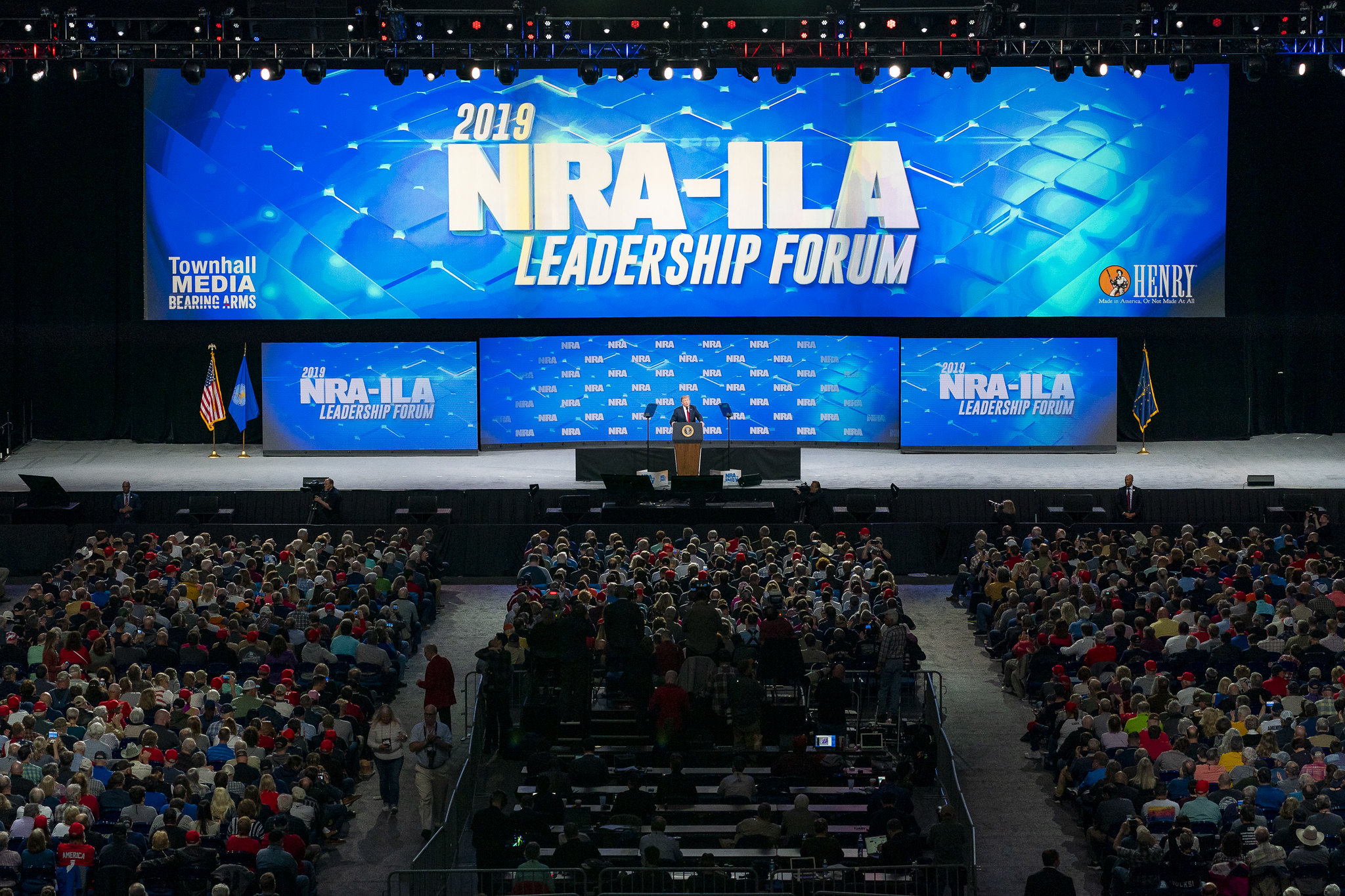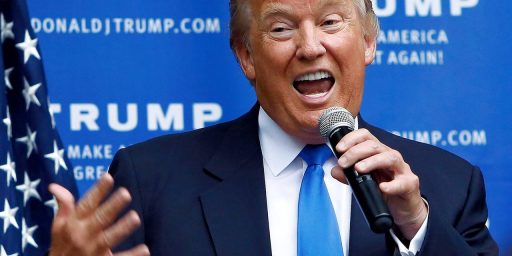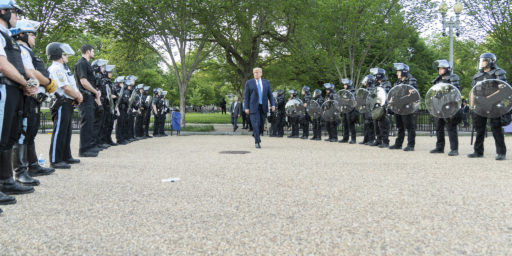A Fascistic and Authoritarian Response
Donald Trump and friends speak to the NRA.

A caveat: the point of this post is not to suggest specific gun-related policies (because it doesn’t, save to suggest that weapons like AR-15s should not be so readily available), but to address the political approach that many are taking in regards to our clear mass shooting problem–and in our national politics more broadly cast
As long-time readers know, I am cautious about the deployment of the f-word. Fascism is a term that is often used solely as a political insult to incite a reaction (see, e.g., Putin’s deployment in regards to Ukraine) and it is the kind of rhetorical escalation that cause people to stop listening to you because it can sound more like hyperbole than analysis. Still, as I hear and read about various responses to the Robb Elementary shooting in Uvalde, the word keeps coming to mind.
As I wrote in the aftermath of the gassing of protestors in Lafayette Park so that Trump could have a photo op (Trump and the F-Word),
Force. Will. Violence. Treating political opponents as enemies.
This is fascistic language.
[…]
Fascism is an ugly word that has an ugly history. It is not a word I use lightly. It has its origins in Mussolini’s Italy, where the word was embraced, and was applied to Nazi Germany. It is further associated with Franco’s Spain and could arguably be applied to the actions of many Latin American dictatorships such as Argentina and Chile in the 1970s.
[…]
The word is often used imprecisely and as an epithet. I am not using it as an epithet here. I am using it as a reasonable descriptor of what we are seeing on our streets and from the White House.
[…]
And to answer my questions directly, I would not classify Trump as fascist in the full sense of the term (that would require a different conversation and this post is already too long). But, clearly, he and his administration are both acting fascistically and promoting fascistic behavior.
And that assessment is more than bad enough.
I am hearing such rhetoric appeals now.
For example, Trump’s speech to the NRA strikes me asfascistic and authoritarian. It was full of distortions of truth along with outright lies. It used the language of force.
I think that the distortions of truth (some are outright lies, but most aren’t quite, which often makes them more dangerous because semi-truths are easier to believe than outright lies) are hallmarks of this increasing American fascism. To quote Jason Stanley, who wrote the book, How Fascism Works, “The key thing is that fascist politics is about identifying enemies, appealing to the in-group (usually the majority group), and smashing truth and replacing it with power.”
So, we have Trump going with the old chestnut (via WaPo),
“As the age-old saying goes, the only way to stop a bad guy with a gun is a good guy with a gun,” Trump said, quoting NRA chief executive Wayne LaPierre’s remark almost a decade ago in the aftermath of the mass school shooting in Newtown, Conn.
As James Joyner noted, this was simply not true in Uvalde and anyone paying attention knows it. Trying to get us all to believe an untruth is a mainstay of Trump’s approach to politics. While this notion will give solace to those who don’t see the need to do anything about guns specifically, it remains steadfastly misleading, if not outright wrong. And it ignores the fact that we could work a lot harder than we do to keep the “bad guy” from getting high-powered weaponry in the first place.
There is also the infantilizing nature of talking about these life and death matters as simply “good guys” v. “bad guys.” That language conjures comic books, action movies, and kids “playing pretend” in the yard on a long summer afternoon and not the slaughter of innocents with weapons designed for that very purpose. Indeed, the reticence of the Uvalde police to confront the killer underscores that it is manifestly unwise for such weapons to be so easily accessible to the general public.
Back to Trump specifically, there is, of course, the promise that he, as president, would use force to solve these problems:
“If I ever do it again, namely run for president and win, I would no longer feel obligated to do it that way,” Trump said. “I would crack down on violent crime like never before.”
The clip for that is here (the second one):
If one watched the whole clip one gets a lot of untruths about what the federal government did, or did not, do during the summer of 2020. There is also grand exaggeration about what the protests themselves were doing in those cities (as well as some clear dog-whistles about the protestors). There is also the echo here of his RNC speech in 2016: “I alone can fix it.” (Not to mention “this American carnage” from his inaugural).
To be clear: we have untruths, appeals to force, and personalization present in this speech–all before an audience who clearly believes that violence is an ever-present possible solution to various problems.
And, I would note, it is not just Trump engaging in rhetoric edging into the fascistic. Note the following (via CNN):
Cruz, meanwhile, blamed a “cultural sickness,” including fatherless children and video games, for mass shootings. He said schools should have a single entry point defended by multiple armed guards.
The “culture sickness” stuff has more than a whiff of the Orban approach and dovetails well with reactionary fascism that calls for us to return to our cultural past to solve our problems (and if you want to read about culture in just exactly in that vein, I would point you to Mein Kampf which has a lot to say that sounds similar to Orban and Cruz, quite frankly). While I understand that people can make anodyne calls for simpler times (not that such things ever truly existed), the political rhetoric of cultural fixes when combined with the rhetoric we are seeing here deflects from the real, current problems (we have not fully processed the Buffalo shooting as we try to deal with the Uvalde one). While “gaslighting” has become a cliché, I can’t help but think that that is what we are seeing here: a deliberate attempt to convince people that what they see with their own eyes isn’t true, so they should believe some outlandish alternative.
To quote Orwell from 1984, “The Party told you to reject the evidence of your eyes and ears. It was their final, most essential command.”
People around the world play video games; other countries don’t have regular mass shootings.
People around the world are raised by single parents; other countries don’t have regular mass shootings.
Indeed, it also seems cliché to note: we are the only country that regularly has this problem.
In fact, the ongoing rhetorical denial that this problem truly is a uniquely American one is yet another example of the gaslighting all of this rhetoric produces. One can argue that for any number of reasons we can’t do what Australia or the UK did in response to mass shootings, but we need to at least be honest about it. The problem isn’t mental health (although that is a real problem) and the problem isn’t the number of entrances at schools. The problem is rather manifestly easy access to very dangerous weapons.
Two last examples:
South Dakota Gov. Kristi Noem attacked advocates of gun safety legislation.
“Let me tell you the truth about the enemies of the Second Amendment. They are schooled in the ways of Marx and Lenin,” she said.
It is a hallmark of fascism to attack the left and say that everything is Marx and/or Lenin. The odds are high that I have read more Marx and Lenin than has Noem, and I am at a loss to see how suggesting regulation of firearms is somehow the hallmark of Marxist-Leninism. Indeed, it is an absurd non-sequitur.
I would note, too, as per the Stanley quote above, she is trying to cast her political opponents as the enemy. This kind of rhetoric is not about reasoned disagreement. It is quite clearly, “us v. them.”
And NRA CEO Wayne LaPierre said that “if we as a nation were capable of legislating evil out of the hearts and minds of criminals who commit these heinous acts, we would have done it a long time ago.”
(Side note: that LaPierre still has a position with the NRA after all of his personal extravagances at the expense of the organization tells you a lot about how corrupted it has become. And it is worth noting that he was not honest about the group’s finances with the group itself. The idea that all of this is about fundamental rights rather than being a piggy bank for LaPierre is laughable).
It is true that laws cannot force morality into the hearts of humankind (indeed, LaPierre is an example of this). But it is also true that we engage in policy-making to try and shape outcomes, and when those outcomes are not achieved at a 100% success rate, they do shape outcomes. Just consider that fact the next time you drive a car or eat at a restaurant. Indeed, as my friend and fellow political scientist, Greg Weeks, noted on Twitter: “the law literally prevented him from buying a gun until he was 18.”
To link this back to Trump: the idea that we are all helpless unless we have a strong leader in place to solve all of our problems is pure fascism. It is certainly authoritarian.
All of the above sums to the following ingredients:
- An appeal to the personal power and will of a given leader/party.
- An appeal based largely on violence, whether it be the violence of the state or the violence of the right kind of citizens.
- An appeal based on false narratives if not outright lies.
In short: elect Donald Trump (or Ted Cruz or Kristi Noem) and they will make sure that schools are treated as military targets because all we need are some combination of “good guys with guns” and limited entry. Many will forget that in other shootings, the gunman can in by breaking a window. Many will forget that past gunmen have been confronted by officers on site. Many will forget that it is impossible to “harden” school in a way that makes it invulnerable to attack. Many will forget that we are not at war and so the notion of treating elementary schools like military installations should be understood to be grotesquely absurd.
Above all else, many will have to ignore that there were armed police present, who did not act.
And many will have to believe that Trump, or someone like him, will simply have the will to take a tool (federal law enforcement) not designed to deal with this problem and will somehow be able to fix it. (And they will want to believe it because many think we are under assault by a massive crime wave, perpetrated mostly by urban persons of color).
All of this sums to a fascistic politics and beliefs that authoritarian force will solve our problems.
It is a far from comforting situation.
Allow me to conclude with a bit of irony (or, hypocrisy, if you will) via NPR: Guns are banned during Trump’s upcoming speech at the NRA conference. Note that Trump himself said at the event, “In the absence of a member of law enforcement, there is no one you would rather have nearby when a crisis strikes than an armed expertly trained member of the NRA.”
Given that, surely he would have been safer if the hall had been filled with armed NRA members, yes?
But, of course, none of this is about logic or policy efficacy, it is about using narratives to get the support needed to return to power.






As always, well said Steven. Thank you.
Thank you, Steven.
One quibble with your solid post is that Putin’s invasion of Ukraine has all the hallmarks of fascism. It’s an authoritarian regime headed by one leader expected to solve everything, based increasingly around ideas of misogyny, anti-liberalism, and a return to a storied past of national glory which was snatched away by a treasonous ethnic group which has no right to exist. Which part of fascism is missing there, in your estimation?
On top of that, there is the deportation of the Ukrainian population with a special focus on eliminating ethnic activists, over 250,000 children stolen into Russia and more than a million Ukrainians sent through Filtration camps that separate family members and often send people to actual Siberia. Add to that the destruction of Ukrainan language books in occupied territories and extension of the school year to ‘deUkrainianize’ Ukrainian school children. Oh, and also stealing grain to starve the remaining population.
To me, that seems like the single most fascist campaign since 1945. If you feel that’s a wrong term to use, what do you believe it’s missing to make it fascist in your estimation?
Dr. T, shame we can’t upvote an OP. The definitions of fascist, authoritarian, totalitarian, etc. are vague and overlapping, but Trump and other GOPs seem to be checking all the boxes.
@RecklessR: I believe Dr. T was referring to Putin’s constant use of the word fascist to describe Ukraine. I think we’d all agree Putin is more fascistic, and more effective, than Trump. And a role model for Trump.
If they didn’t gaslight – that is if they were to allow for any realistic view of what is happening in this country now with gun violence – wouldn’t they have to own up (even a little bit) to being monsters as they continue to fight for their maximalist position on guns. The dual fantasies – that it’s not about guns and that the Democrats are the true evil – are all they have to hold what little consciences they have at bay.
I was struck by a specific part of the Jason Stanley passage you’ve cited:
Identifying the majority group the enemy is apparently unusual. I think there might be some hope in that. If people can be made to see that the minority rule is underlying problem to everything else, The People have the numbers to pull us out of this death spiral.
@RecklessR: As @gVOR08 correctly notes, Putin keeps saying he is fighting fascism as justification for his war in Ukraine—that is what I was referencing above.
I agree with you that he, himself, is a fascist.
This was my first reaction to news about the convention – how is that guy still in charge? The NRA in general and that man in particular have brought a new facet to the definition of “bullet proof.”
So if there was a political party that had it’s own paramilitary group that surrounded the White House, burned a church, and injured dozens of police and Secret Service would it be fair to describe them as fascist?